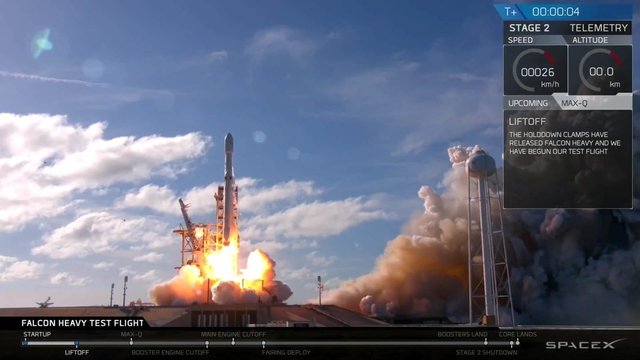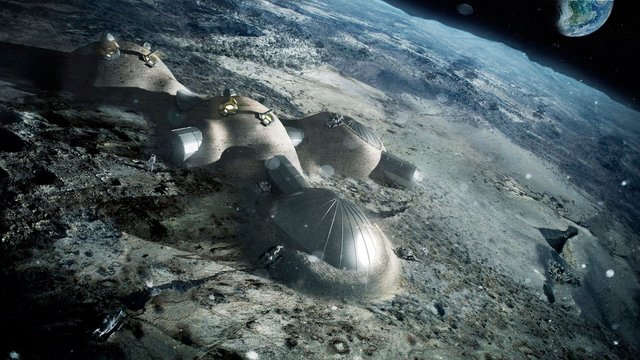SpaceX has made history
SpaceX has made history. The launch of the Falcon Heavy rocket has been a success. Now, it's time to review the best moments and see what has been left unanswered. But, above all, what is the impact of this release? Let's find out!
It is history. The SpaceX Falcon Heavy has taken off and has been a great success. Now, we have to look back and see what we have experienced this afternoon and, above all, why it is a historical event and what we can expect in the coming months and years.
It must be said that the day has not been exempt from minor inconveniences. The launch was originally planned for 19:30 (Spanish time), but has been delayed until 21:45 (in Spain, 14:45 in CDMX, 15:45 in Colombia and 17:45 in Buenos Aires). Although the sky was clear, apparently it has blown quite a lot in Florida, so they have had to delay it. The one at 9:45 pm was the last moment in which it was possible to launch today. If it had not been, the launch would have been delayed until tomorrow.
In this post I will not go into the technical details of Falcon Heavy, today I focus on why what has happened is so important:
After several doubts and delays, the key moment has arrived. At 3:45 pm (local time in Florida), the Falcon Heavy rocket took off. Watching the video, you might think that what happens is simple and that it costs nothing to make a rocket and send it into space. But it's not like that.
That was one of the most delicate moments of the mission. The most logical thing, considering that it was the first time it was launched, is that something could have gone wrong and the rocket could have exploded when taking off or shortly after. Maybe by some miscalculation, or by other factors... Elon Musk himself said it before the launch. If the rocket took off and explode at low altitude of the launch pad, that would be an achievement. And he does not lack reason, because this video can lead to deceit. I suppose the experience with Falcon 9 has helped them.
The fact is that, with the doubts of the launch dissipated (and with much emotion) another key moment arrived, although it could not seem like it, seeing the rocket going through the atmosphere. It was the time of "Max-Q". That is, when the Falcon Heavy experienced the greatest aerodynamic load. At that time, the rocket could also have disintegrated (because it could not withstand the pressure and the load it was being subjected to). And, to tell the truth, again, it would not have been surprising either, because we can not forget that it was a test flight. I could fail.
From here, we could almost say that everything else is a spectacular moment after another. Eye, the launch, by itself, is already spectacular. From Saturn V in 1973, and the Russian energy rocket, in the 80s, no such powerful rocket took off.
The objective of SpaceX with this test flight was quite ambitious. Not only did they want the Falcon Heavy to take off, they also wanted to recover the three rockets used. This is the moment in which the two side rockets are released to return to the surface.
And almost no time to react, just after, the central rocket also takes off from phase 2. Everything was going well to SpaceX. The launch had been a success and we entered a part that promised to be spectacular, while the spacecraft continued its journey.
Everything around the launch has had a point of emotion. Not only because we have seen something that was really complex. Also where it has been made. The launch platform was the 39A of the Kennedy space center in Cape Canaveral, the same used by the Apollo program. That is, we were watching a launch from the same platform in which a Saturn V rocket took the astronauts for the first time to the Moon (and in five more missions). It is something difficult to ignore, especially for those who lived it live.
A few minutes later, we lived something that although it is already, to a certain extent, familiar, it was even more spectacular. You see, one of the objectives of SpaceX is to make space flight cheap. For this, they have manufactured reusable rockets, which can fly several times. The two side rockets of Falcon Heavy had already been used in the past (as Falcon 9 rockets) and had already landed once. But on this occasion, we had to see how two rockets landed, already reused, at the same time, and the result speaks for itself. It is spectacular.
The two rockets landed on two platforms at the base of the US Air Force at Cape Canaveral. It is very close to the Kennedy Space Center, from where they had taken off just a few minutes before. Two rockets landing back on Earth, by themselves. It is a demonstration of how much technology has advanced. Something like that, only a few decades ago, would have been completely impossible and considered proper to science fiction. But reality often surpasses fiction, and this has been one of those times (and for good!).
There remained only one unknown. What would happen to the central rocket? Because of its speed and height, it was too far away to be able to try to land at the base, so the ocean platform "Of Course I Still Love You" from SpaceX, some 500 km from the coast, would be used instead. Only a few seconds after the landing of the side rockets, we should see the landing of the central rocket on the ocean platform.
But, during the broadcast, SpaceX has offered at all times another signal (which is still available) and which suggests that the central module has not landed on the ocean platform. They clearly say "We lost the center core". It could mean that they have lost contact with the communication systems of that rocket. However, at the time I write this post there is still no news of the central module. So it does not look good, That is, it seems that either it has crashed into the ocean, or it has landed on the platform but it has not stabilized and it has ended up losing its balance. In any case, this should not be seen, much less, as a failure. On the contrary, they will learn from it.
Today is historic. It had been four decades since such a powerful rocket was launched. It has been a success and, in addition, it has opened the doors to something that, until only a few hours ago, still had something of fiction: sending crews to other places. There is a lot left for that, do not be deceived. But with Falcon Heavy, for example, there is a rocket capable of sending the necessary elements to the Moon to build a lunar base, assuming that NASA wants to focus on it, or that the ESA (European Space Agency) does so in 2030
If you have not been able to see the launch of the Heavy Hawk (or just want to revive it). Is here:


here comes the future!
That's right, the future is near and more than we think
I haven't had time today to look into this then I just saw your post. Perfect timing. Thanks for the writeup! Those videos (and the cheering) are intense.
I'm glad that my post helped you to find out about the great event yesterday, really spectacular
Hi, I found some acronyms/abbreviations in this post. This is how they expand: